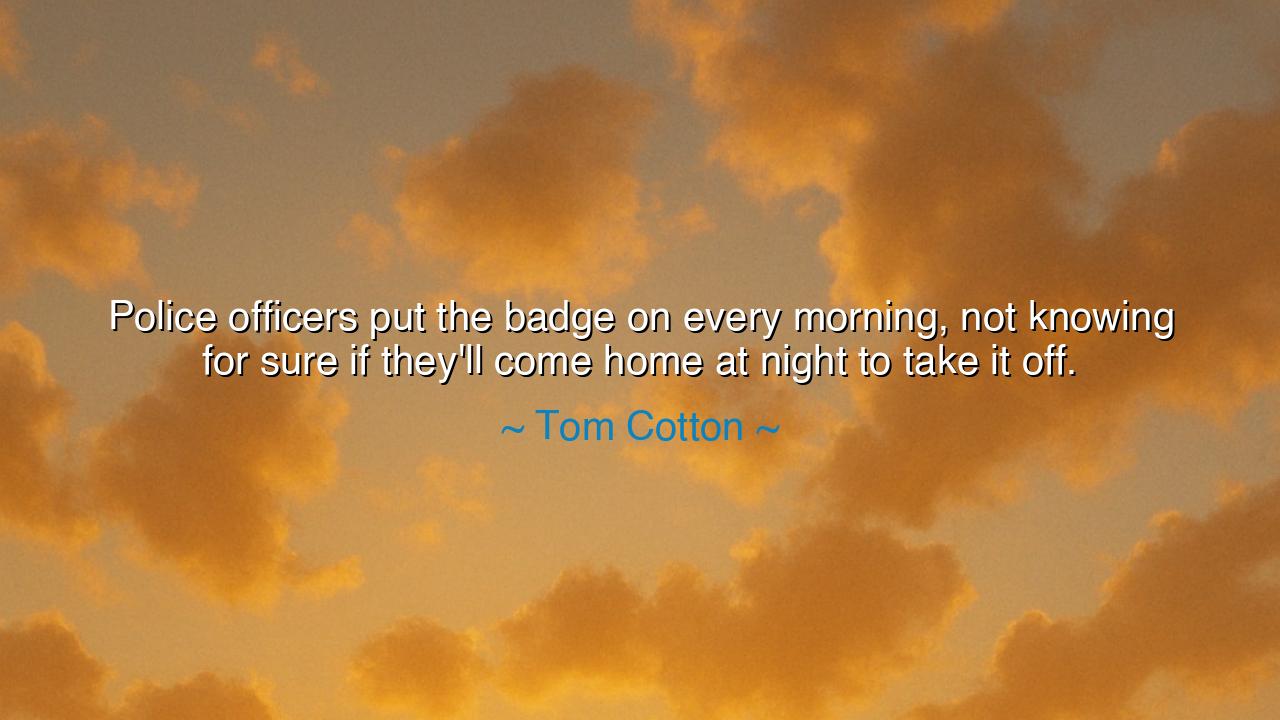
Police officers put the badge on every morning, not knowing for
Police officers put the badge on every morning, not knowing for sure if they'll come home at night to take it off.






The words of Tom Cotton, “Police officers put the badge on every morning, not knowing for sure if they'll come home at night to take it off,” stand as a solemn testament to the courage that walks quietly among us each day. In this simple truth, spoken without ornament, lies the essence of sacrifice, duty, and the fragility of life. It is a reminder that those who serve in protection of others live each day in the shadow of uncertainty, stepping forward not because they are fearless, but because they have chosen to stand between chaos and peace. Like the warriors and guardians of old, they accept danger as their companion, and through that acceptance, they give meaning to courage itself.
To put on the badge is not merely to don a uniform; it is to take up a sacred oath. The badge, cold and shining, is a symbol of trust — the promise that one’s life will be used to shield others, even at great personal cost. In the ancient world, such a calling was considered divine. The Spartans had their shield, the samurai their code, the Roman centurions their honor. In our age, it is the badge that bears this lineage of protection. Yet Tom Cotton’s words reveal the weight that comes with it: each morning when the sun rises, those who serve must face the possibility that they may not live to see its setting. Theirs is not the luxury of certainty, but the nobility of choice — the daily choice to risk their life for the lives of others.
In history, we find many who have lived this truth. Consider Officer Moira Smith, a New York police officer on duty the morning of September 11, 2001. When the towers fell, she ran into the fire to lead others out. Witnesses saw her calm amidst the chaos, guiding the wounded, shouting for them to move toward safety. She did not return home that night; she died in the service of strangers. Her story, like countless others, gives flesh to Cotton’s words. The badge she wore was not merely metal — it was resolve, compassion, and love bound in courage. Her sacrifice teaches that true heroism is not loud, nor boastful; it is quiet, steadfast, and willing.
Yet Cotton’s reflection also carries a deeper, universal wisdom: that all who live lives of service — soldiers, firefighters, doctors, teachers, and parents — share in this same uncertainty. None of us truly know if we will return from the tasks of the day. The difference lies in how we meet that uncertainty. Those who wear the badge meet it with honor. They wake each morning, aware of mortality’s shadow, yet they choose to walk toward danger so others may sleep in peace. This is not mere bravery; it is a form of moral strength that transcends fear — a faith in something greater than the self.
There is, too, a tragic beauty in this reality. For to live knowing death may come at any hour is to live fully awake. Each farewell, each moment shared with loved ones before leaving home, carries the weight of eternity. Those who live by such awareness are closer to truth than most — they understand that life is not measured by its length, but by its purpose. When a police officer steps into the uncertain streets, they live in the ancient rhythm of life and death, service and sacrifice, that has defined humanity’s protectors across the ages.
The ancients would have honored such people as guardians of the city, the living embodiment of civic virtue. Plato himself wrote that the just city depends upon those who love its good more than their own safety. And this is the lesson Cotton’s words urge us to remember: that civilization endures not through wealth or comfort, but through the quiet courage of those who face peril for the sake of others. When the badge is lifted each morning, it is not merely a ritual — it is the renewing of a vow to uphold the fragile balance between order and chaos, peace and destruction.
So, my child of tomorrow, learn this: honor those who risk the day for your night’s peace. Do not take for granted the safety built by unseen hands, or the calm that rests upon the shoulders of those who walk into danger. Live your own life with similar courage — not necessarily with a badge, but with a heart ready to serve, protect, and stand for what is right, even when the path is uncertain. For though not all of us face mortal peril, all of us can live with that same spirit of devotion.
And when you see one who wears the badge, remember the truth of Cotton’s words: that behind it stands a human soul — vulnerable, hopeful, and brave — who has chosen to meet death’s slow approach with steady eyes. In honoring them, we honor the eternal covenant between courage and compassion, between service and sacrifice. And thus, we keep alive the flame of all who have worn the badge, walked into danger, and never came home to take it off.






AAdministratorAdministrator
Welcome, honored guests. Please leave a comment, we will respond soon